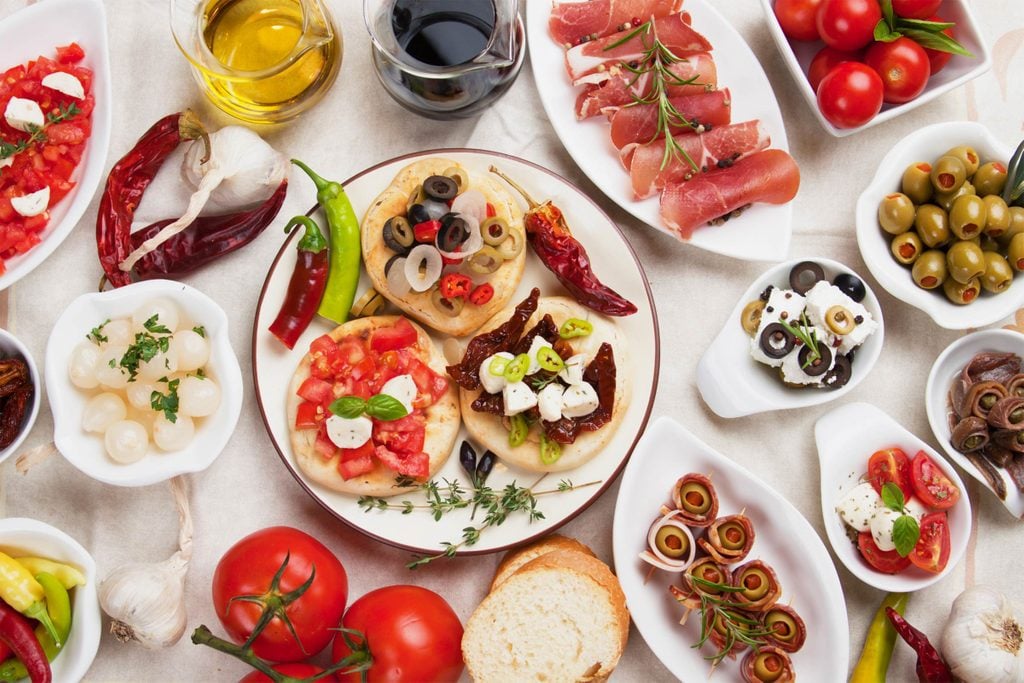The Science Is In! This Diet Lets You Eat Your Way to a Younger, Healthier Brain
Updated: Mar. 17, 2022
You already know that you are what you eat, but your food choices can have an even bigger effect on your brain health. Lucky for you (and your noggin), this delicious diet has just been proved to be the best brain booster of them all.

Add improved brain power in your golden years to the laundry list of health benefits associated with eating like a Greek.
Tons of research has already shown that a traditional Mediterranean diet—loaded with fresh fruits and veggies, healthy fats like olive oil, whole grains, legumes, nuts, and fish, with moderate amounts of red wine and limited red meat—may reduce the risk of heart disease and stroke, certain cancers, diabetes, and Parkinson’s disease. For these reasons, the U.S. News & World Report recently named the Mediterranean diet the second best diet out there, up from fourth place last year.
The latest study, which appears online in the journal Neurology, showed that older people who closely followed a Mediterranean-style diet retained more brain volume during a three-year period than those who didn’t follow the diet quite as closely. Our brains are known to shrink with advancing age, and this loss of volume and brain cells has been linked to memory and cognitive deficits. “Adherence to a Mediterranean diet might slow down brain loss that normally occurs with age,” says lead study author Michelle Luciano, PhD, a psychologist at of the University of Edinburgh in Scotland.
To arrive at their findings, researchers gathered dietary information from close to 1,000 Scottish people around age 70 who did not have dementia. Of these, 562 had an MRI brain scan around age 73 to measure overall brain volume, gray matter volume, and thickness of the cortex (the outer layer of the brain). Four hundred and one other participants returned for a second MRI at age 76. These measurements were compared to how closely participants followed the tenets of the Mediterranean diet.
Specifically, people who didn’t follow the diet faithfully were more likely to have a higher loss of total brain volume over the three-year period than people who were more vigilant. The difference in diet explained 0.5 percent of the variation in total brain volume, which sound trivial, but it amounts to half the size of the variation that’s due to normal aging, the researchers note. The results held when researchers adjusted for other factors that could affect brain volume, including age, education, and history of diabetes or high blood pressure.
Unfortunately, there’s no one magic food or nutrient in the Mediterranean diet that researchers can say makes all the difference. “We do not know what components of the diet might be beneficial for brain health,” Dr. Luciano says. The study did test whether the specific intake of meat (red meat and poultry) and fish were associated with less brain loss over time, but neither was. “It might be that the diet as a whole is important for brain health rather than any individual component,” she says, adding, “Future research is needed to pinpoint which factors are important and how they affect brain volume.” Here are other types of brain food you should be eating lots of.
Next the team wants to test whether the Mediterranean diet is linked to thinking skills, such as memory or information processing speed. Even without this additional evidence, the Alzheimer’s Association endorses the Mediterranean diet for preserving brain health. “Traditional diets like the Mediterranean diet get us away from the harmful elements of the modern-day diet,” says Cate Shanahan, MD, a family physician in Morrison, Colorado, author of several books including Deep Nutrition: Why Your Genes Need Traditional Food. “Modern diets have too many processed carbohydrates and unhealthy fats,” she says.
The Mediterranean diet, by contrast, leans heavily on fresh fruits and vegetables—all of which contain antioxidants known to protect the brain as well as the heart, she adds. It’s also a lifestyle. “When people take the time to cook their own food and don’t stop for fast food on a regular basis, they often prioritize health, so they will likely also go for regular walks and get more sleep,” Dr. Shanahan says. “It’s a package deal.” Here’s how to make your daily diet more Mediterranean.


















